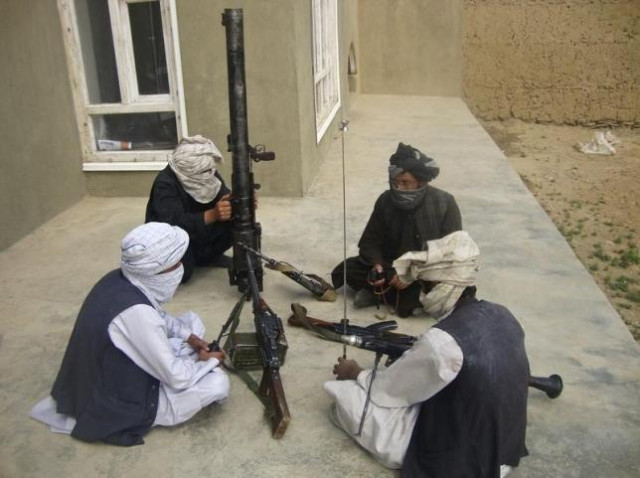Afghan peace process: Efforts being made to revive talks with Taliban, says FO
Nafees Zakaria says JIT evaluating Pathankot probe information provided by India

PHOTO: REUTERS
Pakistan on Thursday said efforts were being made to revive fragile Afghan peace process even as the Taliban this week announced the start of their ‘spring offensive.’
Speaking at the weekly news briefing in Islamabad, Foreign Office spokesperson Nafees Zakria hinted at convening the four-nation meeting to discuss prospects of direct talks between the Afghan government and the insurgent group.
Afghan Taliban announce start of 'spring offensive'
The initiative, led by the Quadrilateral Coordination Group (QCG) made up of Afghanistan, Pakistan, China, and the United States, came to a dead-end when the Afghan Taliban refused to attend a face-to-face meeting with Afghan negotiators in Islamabad in the first week of March.
Thursday’s push comes just days after the Afghan Taliban said that they were launching a ‘spring offensive’ in the war-torn country in a move that many believe may undermine peace efforts.
“It is in the interest of all groups in Afghanistan to participate in the process as this is the best hope to bring peace in Afghanistan and the entire region,” Nafees argued.

The spokesperson said US Special Representative for Pakistan and Afghanistan Richard Olson recently visited Islamabad to discuss the current Afghan situation.
“Olson’s call on the Foreign Secretary prospects of next QCG meeting and situation in Afghanistan were discussed, among other matters and it was agreed that it should be held at the earliest on mutually convenient date,” Nafees added.
Pakistan hopes to broker Taliban-Kabul talks this month
Pakistan’s de facto foreign minister Sartaj Aziz had last week suggested that the QCG was likely to meet in Islamabad this month, but he didn’t say anything about the talks or give a definite date.
The first round of talks was scheduled to take place in the first week of March in Pakistan. But the meeting could not go ahead after Taliban refused to enter into the negotiating table.
Asked to comment on reports alleging that Pakistan was not making serious efforts for Afghan peace talks, the spokesperson said it would be ‘disingenuous’ to question the country’s commitment to the reconciliation process.
“Pakistan has been engaged in sincere and consistent efforts for promoting lasting peace and stability in Afghanistan. To this end, we have been making serious efforts to facilitate an Afghan-owned and Afghan-led peace process,” he maintained.
The spokesperson also dismissed reports that Afghan government refused to be part of the QCG.
“Afghanistan is very much a part of the QCG. All the four countries are committed to ensuring that peace and reconciliation in Afghanistan takes place,” he said.
Afghan Ambassador Hazrat Omar Zakhilwal also on Thursday hoped that Pakistan could still persuade the Afghan Taliban to return to the negotiating table despite their announcement to start the spring offensive.
Afghan peace process: Gen Raheel, Gen Nicholson review talks resumption
Pak-India relations
Answering a question, the spokesperson said Pakistan’s doors for finding a solution to all outstanding issues with India were still open.
He said the two countries were in contact with each other to work out modalities for the foreign secretaries’ meeting even though the Pakistan High Commissioner recently said the dialogue process between Pakistan and India was currently ‘suspended.’
Commenting on the current unrest in Indian Kashmir where four civilians had been killed by Indian forces, Nafees said Pakistan had always highlighted the human rights violations in the disputed Himalayan state at the UN and other international forums.
“A number of civil society organisations and human-rights activists have also been raising the issue of human rights violations pertaining to torture, illegal detentions, extrajudicial killings and enforced disappearances,” he said.
However, he said Pakistan was committed to resolving all outstanding issues through a “sustainable, uninterrupted and meaningful” dialogue with India without any preconditions, in order to address each other’s concerns, and establish lasting peace.
Asked about progress in the Pathankot investigations and India’s demand for allowing its investigators to visit Pakistan, Nafees said that the five-member joint investigation team (JIT) was formed under Pakistan’s our policy of extending cooperation in counter-terrorism efforts.
He added that investigations into the attack were continuing and that the team was still evaluating information shared by India.
Published in The Express Tribune, April 15th, 2016.



















COMMENTS
Comments are moderated and generally will be posted if they are on-topic and not abusive.
For more information, please see our Comments FAQ